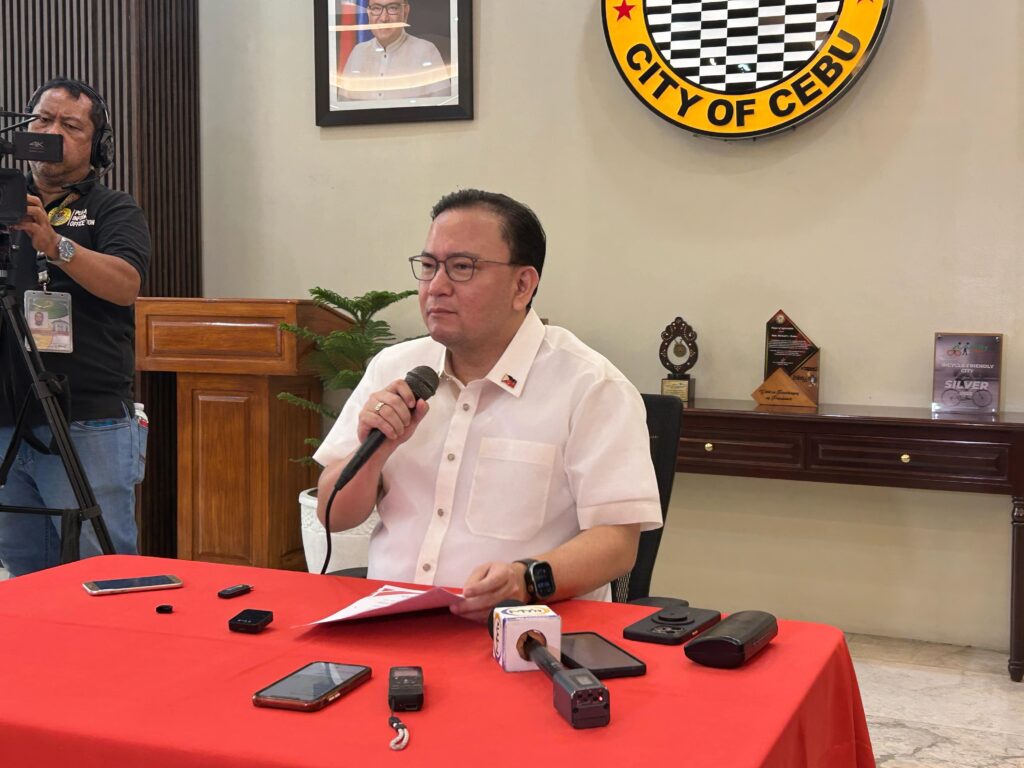
Cebu City mayor Raymond Alvin Garcia signed EO No. 22 to enact the RPVARA Law in Cebu City. | Photo by Niña Mae Oliverio
CEBU CITY, Philippines — The Cebu City Government is giving delinquent taxpayers two years to settle their obligations and penalties.
Cebu City Mayor Raymond Alvin Garcia on Monday, November 18 issued Executive Order (EO) No. 22 to adapt the Real Property Valuation and Assessment Reform Act (RPVARA) or the Republic Act No. 12001 in Cebu City.
RA No. 12001 was enacted last July 5, 2024.
It aimed to bring reforms to the real property valuation and assessment system and offers relief to taxpayers through a two-year amnesty on interest and penalties for those with unpaid real property taxes.
Garcia made the EO to reiterate the implementation of the newly enacted law, which grants amnesty on penalties, surcharges, and interests imposed on unpaid Special Education Fund, Idle Land Tax, and other Special Levy Taxes.
This also means that those who have real property in Cebu City like land, building, machinery, facing penalties, have “two years to pay the principal and no need to pay the penalties” according to Garcia.
“The two years will start from July 5, 2024 until July 4, 2026. So, I am encouraging tax payers who are delinquent in the payment of real property taxes to come to City Hall and pay their obligations because we are waving all penalties, surcharges, and all they have to pay only is the principal amount,” Garcia said.
With this EO, Garcia hoped that the taxpayers would take advantage of the amnesty, and proceed to the City Hall to pay, noting that some taxpayers would complain that their penalty is bigger than the principal amount.
Garcia said that the EO covers “all delinquent” taxpayers regardless of the year, whether they are from 2023 or even earlier.
“Kung delinquent ka, wala ka kabayad og 2023, this will apply, 2022, this will apply,” he said.
Moreover, Garcia also said that this would also increase Cebu City’s revenue as more people will pay to take advantage of the amnesty.
“How will this affect the revenue? So I think it will increase, right? It’s the same to the principle that states 1 peso today is better than 10 pesos tomorrow. And tomorrow you’re not even sure if you can collect that amount,” said Garcia in Cebuano.
“It’s good that you have the cash now, so that you can allocate it for public service. Rather than, 10 years after, they will pay. A bigger amount will be used. And you’re not even sure if they will pay or not,” he added.
To note, the City’s tax ordinance has not been updated since 2003. Garcia said that this implementation is part of the RPVARA law.
“Now, the RPVARA law, it fixes, that ang magbuot karon sa absolute values of real property is not anymore the Sanggunian Panlungsod. It now belongs to the BLGF (Bureau of Local Government Finance). That is what the RPVARA law is about,” Garcia said.
“But the RPVARA law also mandates an amnesty for 2 years. So we have to wait for the 2 years to lapse. Then, diha pata mosud sa pag change sa absolute values,” he added.
In the meantime, the mayor said that the City is “doing a good job” in collecting tax from delinquent payers.
“But I’m hoping with this amnesty, they will be even doing a better job,” he said.
Garcia also hoped that with the new tax reforms would entice more taxpayers to settle their obligations so that the city can post higher revenues.
Higher revenues also meant more chances for the city to propose supplemental budgets, he added.
READ MORE
Raymond Garcia offers to pay insurance premium for delivery riders
Raymond Garcia’s takeover as mayor ‘invalid’, says Rama’s lawyer
Davao City tops in tax collections
Those who would avail for the amnesty, the taxpayers must submit a written application for amnesty to the City Treasurer’s Office (CTO).
Then, the CTO will compute the total amount of basic real property tax due, excluding penalties, surcharges, and interests.
Taxpayers have to pay in full the payment of the computed basic real property tax due before the deadline to qualify for the amnesty.
Lastly, the CTO will issue a tax clearance upon request by the taxpayer and payment of the appropriate and required fees.
Section 6 of Garcia’s EO states that taxpayers who are unable to settle their delinquent taxes in full may avail of an installment payment plan under terms and conditions to be prescribed by the CTO.
“The total amount due must still be paid within the amnesty period to qualify for exemption from penalties, surcharges, and interests,” it added. / mme

